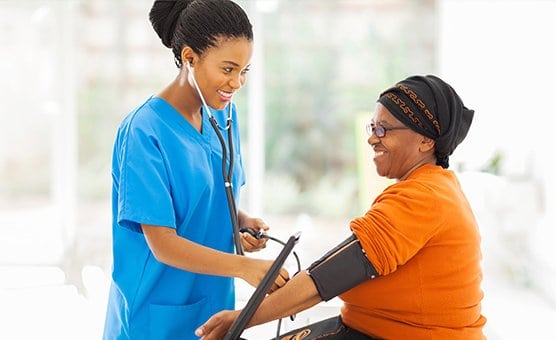For the sake of our health, it’s important we’re comfortable talking about every medical issue we come across – from reproductive and sexual health to mental illness and chronic pain. But, our survey of 2,000 Brits found that 14% of the population feel it’s difficult to talk to their doctor about their reproductive health. Worryingly, almost one in ten women (7%) said they have no-one to talk to about any issues they might have around this topic.
Yet, the British Medical Association (BMA)[1], says reproductive health is vital for our overall wellbeing, preventing morbidity and helping maintain economic productivity. This is particularly significant for women as they are more likely to come into contact with health services than men.[2] and more likely to receive a wrong diagnosis than men. Still, the BMA notes that women are “more likely to miss appointments due to their caring responsibilities.” When they do make it in, our research found that 14% of women find it difficult to talk to their doctor or other medical professionals about this particular issue.
What does this mean for women’s health and wellbeing? We asked consultant gynaecologist Dr Anne Henderson to help shed some light on the issue.
Do patients trust doctors?
Our research found that 1 in 10 Brits don’t feel heard or believed when they talk to doctors about their reproductive health. “For many GPs,” adds Dr Henderson, “training in reproductive health is rudimentary; their only knowledge tends to be theoretical.” With this in mind, it’s possible that patients are missing out when it comes to the quality of care they receive, and the depth of knowledge required to make accurate diagnoses.
So, do patients trust doctors? Dr Henderson’s observation has been that most patients still do. “But,” she caveats, “that trust is much less implicit than it was 20 or 40 years ago.” She points out that, “with social media and the vast amount of freely available information on the internet, patients are now more informed than ever, and more likely to question their doctors.
“It’s not uncommon to see patients go to their GPs with a copy of the 2015 NICE (National Institute for Health and Care Excellence) guidelines or the 2017 Royal College of Obstetricians & Gynaecologists Guidelines. While these guidelines are fine to follow, patients should be careful when it comes to looking up information online. Within each speciality, there will be a handful of reliable, accurate and up-to-date websites that your doctor can direct you towards.”
Our research found that the older we are, the more trusting we are of GPs, with over 60% of people over 55 going to their GP for information. In contrast, only 33% of 16-24 year olds say they’d go to their GP to find out about their health.
Are we comfortable with talking about our reproductive health?
For Dr Henderson, ‘Dr Google’ is never going to be as reliable as a trained gynaecologist, and she says GPs are still the best first port-of-call for patients with any worries or concerns about their health.
Positively, our research found that over half of Britain will go to their GP to look for answers about symptoms they might be having. But more than 1 in 10* Brits still say it’s difficult to talk to their doctor about their reproductive health (with younger people finding it hardest). Considering why this might be the case, Dr Henderson points out that “many patients would like to be able to speak to the same doctor each time so they can follow up on previous issues without starting their story from scratch.”
Unfortunately, she adds, modern GP surgeries see so many patients and offer so few appointments that patients often have no choice but to book the first appointment they can get. “Encouragingly, most of the patients I see are keen and are happy to discuss their problems with any doctor they get. Certainly, the taboos that were there 10 or 15 years ago are no longer there now.”
Are we worried about our reproductive health?
As we become more comfortable talking about this issue, are we also less worried or stressed about it? Over half of Brits (54%)* comfortably said they were not worried or stressed about their reproductive health. That said, it’s still worth acknowledging that 18% of men and a larger 26% of women say they are ‘quite worried’ or ‘very worried’ about their reproductive health – with 13% of Brits saying they don’t know enough about it to be worried.*
So, how informed are we about an issue that could have wide-ranging social, economic and personal implications? Discover the extent of Brits’ knowledge about their reproductive health, and what this could mean for society at large in our article.
Methodology
The research was conducted by Censuswide between 22.05.2019 – 28.05.2019, with 2,008 general respondents aged 16+ in the UK. The survey was conducted from a nationally representative sample of UK adults. Quotas were applied to nationally representative proportions for age, gender and region. Censuswide abide by and employ members of the Market Research Society which is based on the ESOMAR principles. All statistics with an asterisk have been obtained through this research.
Expert bio
Dr Anne Henderson has been a Consultant Gynaecologist within the NHS and private sectors for 15 years. In this time, she has extolled the virtues of consultant-led care, offering patients complete continuity of care as well as the expertise and experience offered by the extensive training undergone by UK consultants. She is a strong advocate for multi-disciplinary care, including complementary therapies, herbal therapies and nutritional support through her private practice. She is the founder of Gynae-Expert, using her clinical expertise and extensive training to inform, guide and advice patients to help them lead healthy, happy, active lives.
[1] https://www.bma.org.uk/-/media/files/pdfs/collective%20voice/policy%20research/public%20and%20population%20health/womens%20health/womens-health-reproductivehealth-report-aug2018.pdf?la=en
[2] https://www.bma.org.uk/collective-voice/policy-and-research/public-and-population-health/womens-health






